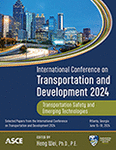Exploring the Role of Human Behavior in Road Crash Occurrence through Analysis of Crash Variability in Highly Similar Road Environments
Publication: International Conference on Transportation and Development 2024
ABSTRACT
Crashes occur due to the influence of the interaction between three factors: humans, vehicles, and the road environment. However, the human factor is often found to be the most dominant factor responsible for crash occurrences. The objective of this study is to assess the contribution of human behavior to the occurrence of road crashes by analyzing crash occurrence in highly similar road environments. Homogeneity in the road environment was achieved by clustering road segments with highly similar characteristics and by controlling the effect of vehicle-related factors, and the variation in crash occurrence between and within clusters was assessed to explore the role of human behavior. The approach developed in this study can be used to understand the variability of the human factor and its contribution to crash occurrence without knowing drivers’ actual behavior. Furthermore, the results can be applied by road management authorities to mitigate road crashes and to prioritize and select appropriate interventions.
Get full access to this chapter
View all available purchase options and get full access to this chapter.
REFERENCES
AASHTO. (2010). Highway Safety Manual. AASHTO.
Adanu, E. K., Penmetsa, P., Wood, D., and Jones, S. L. (2021). Incorporating systems thinking approach in a multilevel framework for human-centered crash analysis. Transportation Research Interdisciplinary Perspectives 9.
Bucsuházy, K., Matuchova, E., Zůvala, R., Moravcová, P., Kostíková, M., and Mikulec, R. (2020). Human factors contributing to the road traffic accident occurence. Transportation Research Procedia 45 (pp. 555–561). Rome: Elsevier B.V.
Dunn, J. (1974). Well-Separated Clusters and Optimal Fuzzy Partitions. Journal of Cybernetics, 4:1. https://doi.org/10.1080/01969727408546059, 95–104.
FHWA (Federal Highway Administration), US DOT. (2017). Road Safety Fundamentals: Concepts, Strategies, and Practices that Reduce Fatalities and Injuries on the Road. In Unit 2: Human Behavior and Road Safety (pp. 4–5).
Gower, J. (1971). A General Coefficient of Similarity and Some of Its Properties. Biometrics, 27(4), 857–871. https://doi.org/10.2307/2528823.
Kamei, H. (2019). The Project for Construction of Sindhuli Road. Retrieved from JSCE The International Infrastructure Archives: http://www.jsce.or.jp/e/archive/project/pj13.html.
Kassambara, A. (2017). Machine Learning Essentials_Practical Guide in R. STHDA.
Marcello, D. (2022). StatMatch: Statistical Matching or Data, R package version 1.4.1.
Maechler, M., Rousseeuw, P., Struyf, A., Hubert, M., and Hornik, K. (2022). cluster: Cluster Analysis Basics and Extensions. R package version 2.1.4.
Oppenheim, I., and Shinar, D. (2012). A context-sensitive model of driving behaviour and its implications for in-vehicle safety systems. Cogn Tech Work 14, 261–281.
Petridou, E., and Moustaki, M. (2000). Human factors in the causation of road traffic crashes. European Journal of Epidemiology 16, 819–826.
Plankermann, K. (2013). Human Factors as Causes for Road Traffic Accidents in the Sultanate of Oman under Consideration of Road Construction Designs [Doctoral Thesis, University of Regensburg]. Burglengenfeld, Germany.
Treat, J., Tumbas, N., McDonald, S., Mayer, R., Stansifer, R., and Castellan, N. (1979). Tri-level study of the causes of traffic accidents: Executive summary. Washington D.C.: US Department of Transportation, National Highway Traffic Safety Administration.
WHO (World Health Organization). (2018). Global Status Report on Road Safety 2018. Geneva: World Health Organization.
Wiper, O., Vuik, S., Cheatley, J., and Cecchini, M. (2022). Cluster analysis to assess the transferability of public health interventions,. Organization for Economic Co-operation and Development.
Information & Authors
Information
Published In
History
Published online: Jun 13, 2024
ASCE Technical Topics:
- Accidents
- Business management
- Driver behavior
- Highway and road management
- Highway transportation
- Highways and roads
- Human and behavioral factors
- Infrastructure
- Pavements
- Practice and Profession
- Public administration
- Public health and safety
- Traffic accidents
- Traffic engineering
- Traffic management
- Transportation engineering
- Vehicle-pavement interaction
- Vehicles
Authors
Metrics & Citations
Metrics
Citations
Download citation
If you have the appropriate software installed, you can download article citation data to the citation manager of your choice. Simply select your manager software from the list below and click Download.
